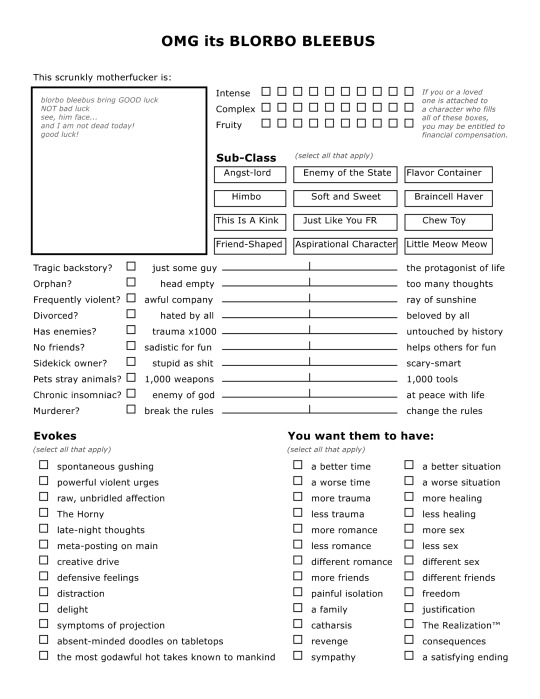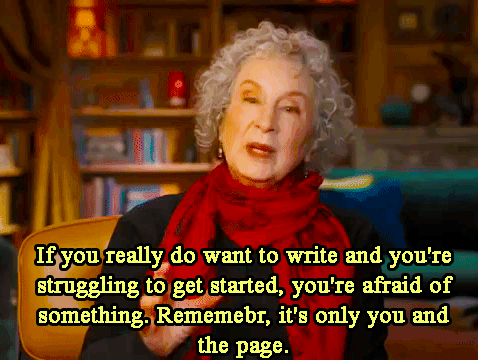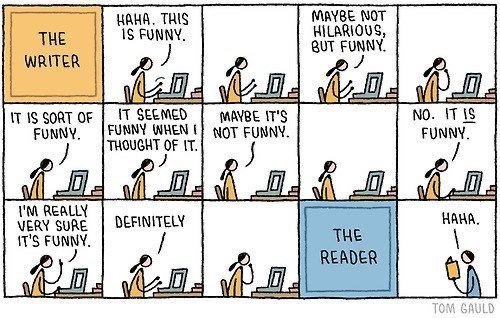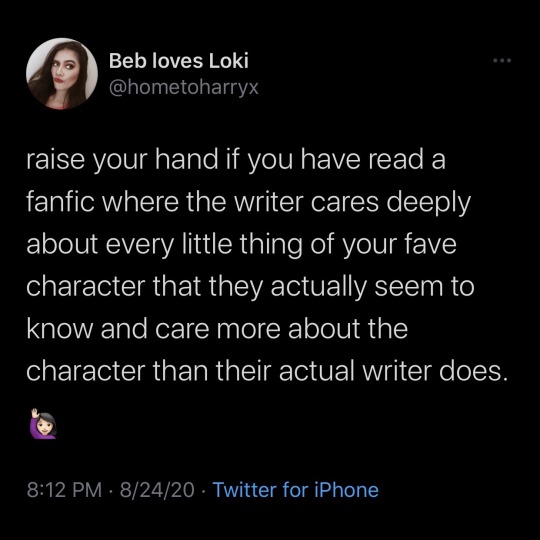My Blog about my many writing escapades and ventures. I write about my problems and issues, review works of fiction, (wether they be officialy published, or fanfictions) and talk about my methods of writing in general.
Last active 60 minutes ago
Don't wanna be here? Send us removal request.
Text

i made a character sheet. free to use as you wish, feel free to change whatever you want XD open source ass thing. spent all of ~maybe an hour on it.
Credit: the text in the insert-image box comes from this video, and the text for the top three lines (intense, complex, fruity) comes from this post. The actual image was made with the free NBOS character sheet creator, which is a sort of dated but free and solid text-layout sheet maker intended for ttrpg style character sheet creation.
48K notes
·
View notes
Text
This is your friendly reminder that the last few years have been hard, and if your writing has taken a toll as a result, that doesn’t make you any less of a writer. Maybe you went on hiatus. Maybe you got burnout. Maybe life gave you shit and other things took priority. It doesn’t matter. Writing is hard, so when life is hard, you might end up slacking in the writing department. And that’s okay. There’s no rule that says you have to write even when life is shitting on you. You’re allowed to take a break, and you can start writing again when you feel ready.
6K notes
·
View notes
Text
Sexy young immortals are out
Ancient jaded immortals are in
Immortals who have seen the rise and fall of countless civilizations and just don't care anymore
Immortals who don't even view humans as more than pets because their lives are so short
Immortals who try to form connections but know that in 30-40 years the person they're speaking to will be completely different and they themselves will remain exactly the same
Immortals who have watched stars twinkle and die, but still remember the names of the millions of friends they've made over the last few millennia
Immortals who isolate themselves for centuries at a time because they're afraid of losing anyone they connect with
#writing inspiration#writing prompts#i should be writing a paper right about now#havent posted in ages but what the hey
1 note
·
View note
Text
Every piece of work you create doesn’t have to be The Best, Perfect, Flawless Work for it to be meaningful.
The first story I ever started? About teenage girls that get elemental powers and get kidnapped? If I hadn’t written that, I might’ve never tried getting stories out of my head and onto paper.
The first story I ever finished? A YA fantasy with too many characters and flat relationships and a unnecessarily complicated plot? If I hadn’t written that, I might’ve never believed that I could finish a novel-length story.
The first fanfiction I ever uploaded? A self-insert OC fanfiction that overused italics? If I hadn’t written that, I might’ve never gone on to spend a decade writing fanfiction.
The first novel I tried to query? A draft I didn’t much like, a story I was fed-up with, rejections I knew were deserved? If I hadn’t written that, I might’ve never pushed myself to figure out what the publishing process looked like.
The whump snippets I jot down? Help me refine writing whump, writing pain, writing angst and emotions and feelings.
The new tropes/styles I try out? Help me broaden my writing experience, better my writing, allow me to branch out.
The writing, day after day, even if it’s deleted, even if I hate it, even if I think it’s absolute garbage? Help me write, help me get words onto the page, help me flex my fingers and imagination, help me figure out what I’m doing wrong so I know what to do right.
Everything you create is a step forward, even if you don’t see it at the time.
When you look back at old work, it’s easy to cringe, it’s easy to hide your face, it’s easy to wince and wish you did better and pretend like it didn’t exist. But climbing a mountain means accepting that you started at the bottom, means realizing that the view is so much better for the effort, means remembering that even when you couldn’t see the clouds, you kept moving forward.
3K notes
·
View notes
Text
if you ever doubt your writing, be it your themes, or the reason behind it, remember that h.g wells wrote war of the worlds both as a commentary on colonialism and the horrors it brings, and because he fucking hated his neighbours and his 13 hour job, and wanted to write about the town in which he lived getting blasted to the fucking ground by lasers into an irreparable heap and all of the townspeople dying painfully
you, too, can channel your hatred for that guy that lives down the hall and blasts music at 4am into the one of the most influential science fiction stories ever written! fuck it! i believe in you!!
112K notes
·
View notes
Text
How To Reference Romantic Attraction Between Your Characters:
Person A’s inability to make eye-contact for long periods of time while Person B is constantly looking into A’s eyes. (extra points if Person A looks away and blushes)
Interest Copying (When interested in another person, humans tend to copy that person’s movements, stature, etc)
Cute nervous ticks while around one another (Dont just use blushing and stuttering! Other ticks exist! Shuffling, fiddling their thumbs, scratching the back of their neck, bouncing their leg, nervous laughter, picking at their palm, biting the inside of their cheek, etc!)
Remembering little details about one another (How person A never eats the beans on their plate, or person B’s favorite color, the color of their eyes, where their birthmark is, are they a morning or night person? Bonus points if they figure this information out by observation, not by being told!)
Constantly smiling or laughing around their love interest
Confessing their love (but only in Spanish)
11K notes
·
View notes
Note
Do you have any tips on how to create a villain?
Hi :)
How to create a villain
A good villain is ultimately what makes a hero heroic and is therefore a very important part of your story.
Why do we need a villain?
opposite of the story’s hero
their goals and motivations oppose those of the hero
the hero is reacting to the actions of the villain
showcases the hero’s weaknesses
the character of the villain should be one of your priorities while planning the story
Types of villains
human villains
fantasy villains (with magical abilities, superpowers, etc.)
animal villains (e.g., Jungle Book)
abstract villains (an idea, a society, a corporation, etc.)
if you make your villain more abstract, it can have advantages, but it also makes it harder for your readers to relate to them and understand them
if you have an abstract villain, think about using human representations of that villain for your readers to project their feelings and thoughts onto
more specific types of villains:
likeable villain
unsympathetic villain
unpredictable villain
Characteristics of a villain
There are many different types of villains, but they also share a few similar characteristics:
own beliefs and morals – What do they believe in? What is morally correct for them? Do they see themself as bad/evil? How far will they go? Do they make exceptions for some people or do they not care at all? Maybe they want to do the right thing, but they go about it the wrong way.
goals and motivation – goals are things they wan to have or want to accomplish, but motivation is even more important, it explains why they want or need their goal to be fulfilled, you need to invest time into giving your villain a (at least for them) plausible reason for what they are doing
connection to the hero – the hero reacts to the villain’s actions, maybe their fates are intertwined, maybe the hero’s actions in the past led to them becoming the villain, the villain is interrupting and then furthering the hero’s character development the same way the hero is doing to the villain’s development
worthy opponent – being especially powerful, clever, a specialist in something the hero is not, seemingly unbeatable until the end
compelling backstory – people are usually not born bad, it’s something they’ve become over time, it explains the motivation, probably not just one defining moment, if you want one event that changed them, then also think about the reactions from others to that event or what happened afterwards that made them turn evil
similar characteristic to the hero – think about where it went wrong, where did they turn to the dark side? Like I said before, a tragic event does not automatically lead someone to become a villain. Losing their parents young for example can turn them either into the villain or the hero, decide why they turned in that direction that they did
More tips:
Make your villain interesting
your reader should love to hate, but also hate to love them in a way
give them their own character arc and show development
make them special the same way your hero is special
give them a magnetic personality
don’t make them too predictable or the readers will lose their fear of them
Humanise your villains
not born evil, maybe they were corrupted
nothing more frightening than seeing yourself in a villain
give them positive qualities
make the readers sometimes sympathise with them
give them moments of relatability
your readers should be interested in the villain, but not necessarily root for them (only if that’s your true intention), because it could undermine your hero’s actions and motivation
Make them lose
If your story doesn’t end with evil ruling over the world, you need to know how to make the villains lose:
give them weaknesses
let them be a slave to their own moral code
let them have fatal character flaws that in the end the basically defeat themself
give them a worthy ending, something appropriate for a great opponent
Good luck creating believable villains!
- Jana
6K notes
·
View notes
Text
Character development doesn't refer to character improvement in a moral or ethical respect. It refers to broadening the audience's understanding of that character, giving the character a deeper background, clearer motivations, a unique voice.
Developing a character is about making them seem more like a real person, and real people are flawed. Real people make mistakes. They repeat mistakes. They do things other people don't agree with. Real people are more than just 'good' or 'bad' and character development is about showing all of those other aspects of them.
Their interests and hobbies. The song that gets stuck in their head. The fact that their vacuum broke 3 months ago and they haven't gotten it fixed yet. All of those details help build out the character and develop them more.
And yes, characters change as stories progress but that doesn't mean they get 'better' in a strict moral sense. It means that their experiences change the way they interact in the world you've written for them. Just like real people do.
19K notes
·
View notes
Text
Resources For Writing Deaf, Mute, or Blind Characters
Despite the fact that I am not deaf, mute, or blind myself, one of the most common questions I receive is how to portray characters with these disabilities in fiction.
As such, I’ve compiled the resources I’ve accumulated (from real life deaf, mute, or blind people) into a handy masterlist.
Deaf Characters:
Deaf characters masterpost
Deaf dialogue thread
Dialogue with signing characters (also applies to mute characters.)
A deaf author’s advice on deaf characters
Dialogue between deaf characters
Mute Characters
Life as a Mute
My Silent Summer: Life as a Mute
What It’s Like Being Mute
21 People Reveal What It’s Really Like To Be Mute
I am a 20 year old Mute, ask me anything at all!
Blind Characters:
The 33 Worst Mistakes Writers Make About Blind Characters.
@referenceforwriters masterpost of resources for writing/playing blind characters.
The youtube channel of the wonderful Tommy Edison, a man blind from birth with great insight into the depiction of blind people and their lives.
An Absolute Write thread on the depiction of blind characters, with lots of different viewpoints and some great tips.
And finally, this short, handy masterpost of resources for writing blind characters.
Characters Who Are Blind in One Eye
4 Ways Life Looks Shockingly Different With One Eye
Learning to Live With One Eye
Adapting to the Loss of an Eye
Adapting to Eye Loss and Monocular Vision
Monocular Depth Perception
Deaf-Blind Characters
What Is It Like To Be Deafblind?
Going Deaf and Blind in a City of Noise and Lights
Deaf and Blind by 30
Sarita is Blind, Deaf, and Employed (video)
Born Deaf and Blind, This Eritrean American Graduated Harvard Law School (video)
A Day of a Deaf Blind Person
Lesser Known Things About Being Deafblind
How the Deaf-Blind Communicate
Early Interactions With Children Who Are Deaf-Blind
Raising a DeafBlind Baby
If you have any more resources to add, let me know! I’ll be adding to this post as I find more resources.
I hope this helps, and happy writing! <3
119K notes
·
View notes
Text
Shirley Jackson’s The Haunting of Hill House was published sixty years ago today. The novel begins with one of the best openings I have ever read:
“No live organism can continue for long to exist sanely under conditions of absolute reality; even larks and katydids are supposed, by some, to dream. Hill House, not sane, stood by itself against its hills, holding darkness within; it had stood for eighty years and might stand for eighty more. Within, walls continued upright, bricks met neatly, floors were firm, and doors were sensibly shut; silence lay steadily against the wood and stone of Hill House, and whatever walked there, walked alone.”
38K notes
·
View notes
Text
You’re allowed to like your writing.
One unfortunate side effect of the “your first draft is shit” rhetoric (which is mostly meant to encourage the understanding that you will need to edit and that having problems in your first draft doesn’t mean you can’t write) is that people tend to feel like they shouldn’t like their writing. They should only be critical of it, only see the flaws of it, and so be unhappy with their writing.
Being critical is good, but keep in mind that you’re not only allowed but encouraged to like what you’ve written. You should like it because that means it’s something people enjoy reading (because you are a person), but also because you will write better if you enjoy what you’re writing. Reread your old writing and smile at the lines that you love. Enjoy your fun scenes, laugh at your own jokes, cry at the tragedies you’ve written particularly poignantly. It’ll make you feel better. I promise.
20K notes
·
View notes
Photo






Some gold advice from Margaret Atwood from her Master Class on creative writing trailer.
19K notes
·
View notes
Text
How to go from worldbuilding to an actual plot:
1. Pick a time in place in your fictional world
2. Imagine how current events in that time and place would play out if no outside forces intervene
3. Imagine the sort of person who would most drastically fuck everything up for everyone concerned just by showing up
4. Introduce that person to that time and place and tell the story of he resulting catastrophe
11K notes
·
View notes
Text
Imagine you're a writer, and there are people scribbling in the margins of your books, underlining their favorite passages, leaving makeshift bookmarks between the pages (subway tickets, library receipts, handwritten notes), reading excerpts out loud to their friends and lovers or to themselves just to feel the words on their tongue, memorizing quotes and then copying them in their notebooks, daydreaming about your characters and excitingly speculating about what's going to happen to them in the sequel, writing reviews in their school newspaper.
7K notes
·
View notes
Text
Tips For Writing Small Towns
The Everybody Knows Everybody
Usually false. If you lived in a town of 300 people, you might know of everybody, but it’s unlikely you would know each and every person’s individual bask story, job, and family life. As the number goes up, the less likely it is that everybody knows everybody.
Everyone is racist
In my state the more rural you go the more conservative it gets, but it certainly doesn’t mean that everyone who lives in a small town is racist. When a small town has a higher population than the surrounding area, including tourists/seasonal activity, those towns tend to be more ‘accepting.’ Towns along coasts (sea towns, port towns, whatever you want to call them) also tend to be less conservative, as they usually get a larger number of tourists.
Everyone loves/hates living in a small town
In books and movies small town characters often either love living in a small town or hate it. In real life it’s more complicated. Give you characters complicated relationships with their small town life.
Schools
I’m so sick and tired of seeing small towns in movies with huge high schools. Most small towns don’t even have their own high school or even middle school, usually it’s combined with nearby towns. (That also depends on how far apart the residents are spread out.) If it’s a combined-town school then yes, there will be a good number of students.
Economy?
Before I answer this question I’ll split small towns into two groups:
Tourist/seasonal towns, business towns, commuter towns, and low population towns.
Tourist/seasonal towns
Have a low number of full time residents
Are by the ocean, mountains, national park or something else that would draw visitors
Have an ‘off’ season where tourists don’t visit as much
Are considered vacation places
There’s a wide range, but if you take in the seasonals to count middle-upper class
Business Towns
Towns that people live in because of their career
Such as college towns, mill towns, and factory towns
When businesses fail these towns will plummet into poverty
Are mostly lower middle class
Commuter Towns
Commuter towns are towns located by highways or larger towns (such as port towns and other business towns)
These towns are different than suburbs because they are not close enough to a large city
Are mostly middle class, there will be residents who commute to larger towns for jobs such as lawyers and doctors
Low population towns
The stereotypical small town
Often located in “the middle of nowhere”
Can either be spread out or very close together
Are found in rural parts of states
Are mostly lower middle class
Of course, every small town is different! My experience comes from New England small towns, but feel free to add on to this post!
863 notes
·
View notes

